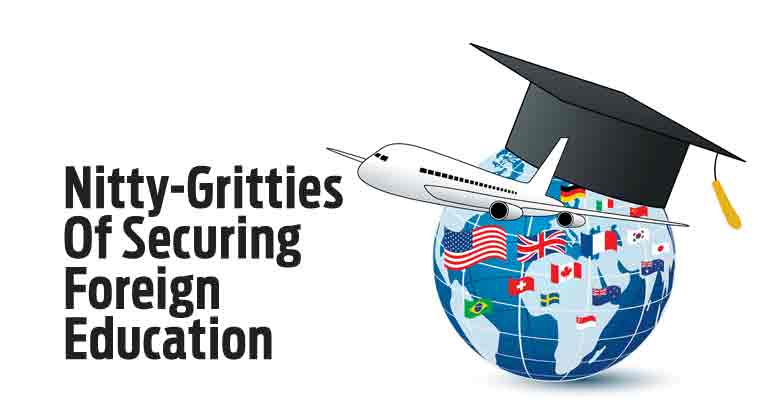Why are Indian millennials increasingly keen to acquire a foreign degree, both at the undergraduate and post graduate levels, before looking for employment opportunities?
“It reflects the growing aspirations, availability and flexibility to pick specific courses, which are unavailable in India and increased funding options.” answered Maninder Kaur, a teacher and mother of two, who are pursuing their degrees in the US.
Students planning to study abroad and their parents should tick off the following boxes. It begins with identifying a course, then the university, the funding, visa process, and application. (See chart) However, funding still remains a major concern. Shrey Bharadwaj, of Meerut, had to struggle for funding when he got admission in Business Finance in WHU – Otto Beisheim School of Management, Germany. A leading private bank in India had assured to fund the `35 lakh educational loan but after he had submitted all documents, it backed out without citing any reasons and that too, just two days before he was to apply for visa. But luckily Oriental Bank of Commerce responded to his plea and issued the amount.
 overnment data also suggests that public sector banks have been providing adequate educational loans, benefitting many students from top cities in India. (See Chart).
overnment data also suggests that public sector banks have been providing adequate educational loans, benefitting many students from top cities in India. (See Chart).
Education loans in India from various banks attract an interest rate between 6.60 per cent and 15.20 per cent, depending on the course, the educational institution and also the country or the city.
“To avail the loan, one will have to apply either at a particular branch of the lender that deals with education loans or apply online. There is an option of applying for loans through Centre’s Vidya Lakshmi portal,” said Adhil Shetty, Co-Founder and CEO, BankBazaar.com.
He further pointed that the portal allows students to apply to as many as three banks at a single time, also check the loan status, and receive a direct credit of funds through a single application form. The portal currently offers a choice of 30 loan schemes from 18 different banks.


He further added that before taking a loan, one should surely compare the offers online and use an education loan monthly installment calculator to understand exactly how much one needs to repay and in what manner.
The loan amount, however, takes care of specific expenses and many others are to be supported by personal funds or part-time employment. “The repayment defers from bank to bank and product and schemes. But typically, it can start from one year after course completion, or six months after securing employment, whichever is earlier. The repayment period is also negotiable, and as per schemes that may range from five to seven years,” said Anjani Kumar Srivastava, Chief Manager, Indian Bank, Ghaziabad zonal office.
According to HDFC Credila, an education loan not only funds higher studies but also helps to save tax. The benefits available with education loan are very attractive.
However, as not every lender is authorised to sanction an education loan, it is strongly recommended to check for the availability of benefits with the lender.
As per Section 80E of the Income Tax Act of India, 1961, the interest paid on the education loan can be claimed as deduction. But, to receive the tax benefits under the Section, one must avail the education loan from any of the scheduled banks in India, or two gazette notified financial institutions HDFC Credila Financial Services and HDFC.
However, managing finances is one of the hardest things while studying abroad, given the new financial system, with new currency and different pricing methods.
“As an international student, it is always ideal to find a part-time job to fund your living expenses. Universities often have established programmes for international students where you could get a part-time job within the university (library, campus, and administrative tasks). It would not pay much, but the best thing is that it is coordinated with your studies. Another option is to take a freelance project,” said Jatin Chawla, Director, Centre for career development, JUMP.
He pointed out that majority of the aspiring students are fixated on universities in the US, Canada and now increasingly towards Australia. And there are reasons for that.
For example, University of New South Wales (UNSW), Sydney, encourages its international students to take up internships for exposure to global work environment. This often helps them to supplement their living expenses as well.
Deeksha Nathani, currently pursuing Masters in architecture at UNSW, is working at an urban design firm and also tutoring a Bachelor of Planning course at the university.
 “At UNSW, Indian students have primarily been enrolling for postgraduate programmes until recently. Enrolments in undergraduate programmes are rising rapidly because of India’s demand and supply gap,” said Amit Dasgupta, former Indian diplomat, and Country Director (India), UNSW.
“At UNSW, Indian students have primarily been enrolling for postgraduate programmes until recently. Enrolments in undergraduate programmes are rising rapidly because of India’s demand and supply gap,” said Amit Dasgupta, former Indian diplomat, and Country Director (India), UNSW.

Chawla draws attention to the problem of securing part-time employment and jobs, post the course in some cases. He also points that there are various institutes that provide guidance and also facilitate the funding like---Avanse Financial Services, HDFC’s Credila and Auxilo Finserve.
“Countries like Finland offer great exposure to its students. There are good funding opportunities that they can avail, in addition to extensive job prospects,” he added.
Suresh Sadgopalan, Founder, Ladder7 Financial Advisories, agreed yet cautioned, “One should consider if the course and country under consideration has good job prospects and whether it can help them to secure one to pay the EMIs, and take care of oneself. If not so, one should not go for a loan to pursue the course.”
Shetty also warned that the main reason for defaulting is due to restricted opportunities after course completion, which happens when the university offering the course is not up to the mark or is unable to attract employers who can pay salaries commensurate with the course fees. “So, it is essential that students evaluate their courses, institutions, and potential earning capacity post the course before availing an education loan,” cautioned Shetty.
That is a fair caution for both the millennials and their parents. A foreign degree and exposure is good, but the financial aspects of pursuing a course abroad should be built into the total planning, lest that becomes the sour point of all the effort.
rajendran@outlookindia.com







